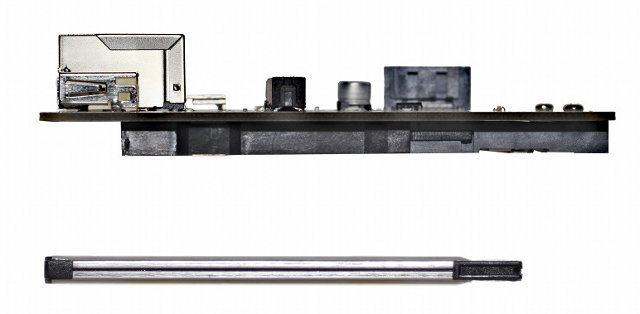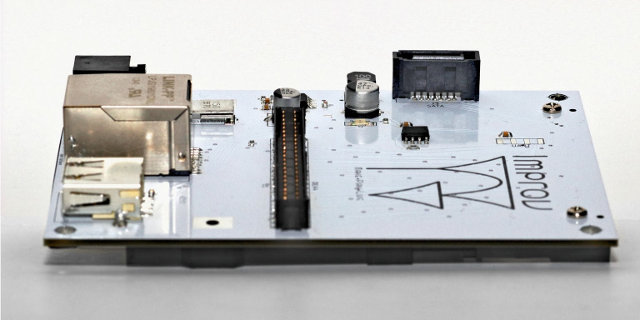After seeing a countdown clock on makeplaylive.com a few days ago, I was expecting the Plasma Active, Linux based Vivaldi Tablet to come up, but instead Improv, an open hardware platform, has just been launched. It features the long awaited EOMA68 CPU card with AllWinner A20 dual core ARM Cortex A7 processor, together with a “feature board”, and is now available for pre-order for $75, with shipping expecting in January. It’s only available in North America and Europe for now.
- EOMA68-A20 CPU board:
- SoC – AllWinner A20 dual core ARM Cortex-A7 @ 1 GHz with Mali-400MP2 GPU
- System Memory – 1GB DDR2
- Storage – 4GB NAND flash
- Video – micro HDMI (video + audio), RGB/TTL pins
- USB – Micro USB OTG + USB 2.0 host pins
- Networking – 10/100M Ethernet
- Other buses – I2C, 8 GPIO, UART0
- Weight – Under 40 grams
- Feature board:
- Storage – 32K EEPROM, SATA II interface
- USB – USB 2.0 host port
- Connectivity – 10/100/1000M Ethernet (RJ-45)
- Connector – 44 PIN DIL with the following signals RGB/TTL, I2C, 8x GPIOs, uBoot pin, UART, GND, and 5V DC
- Misc – Power LED
- Power – 6-12VDC, up to 2.5A. Recommended 9VDC or less.
- Weight – Under 60 grams
The EOMA68 CPU card come in metal case following the PCMCIA form factor, and slides into a PCMCIA header on the bottom of the feature board. Since this is a standard, you’ll be able to keep the same feature board, and simply change the CPU card if you want to upgrade. Other EOMA68 CPU cards I’ve seen considered on arm-netbook mailing list include EOMA68-A31 with AllWinner A31, EOMA68-IMX6 with Freescale i.MX6 , EOMA68-AM3558 with Texas Instruments AM3358, and maybe some others. It’s taken 2 years to get the first card, but now that most details have been working out, I understand development of new cards should be much faster, and is only a matter of getting the funds. Alternatively, it’s also possible to use the CPU card on your own custom designed “feature boards”, or products. For example, EOM68-A20 will probably be used in Vivaldi tablet. Additional hardware add-ons such as VGA connectors, keyboard kits and cases are also in development according to Aaron Seigo, Plasma team project leader.

Contrary to most other AllWinner A20 hardware platform, Improv will not ship with Android and Ubuntu pre-installed, and although these last two are supported, it will instead come pre-loaded with Mer OS, an open source mobile Linux distribution powered by Qt/QML and HTML5. It will boot to the command line by default, but if you need a graphical interface, you’ll have quite a few choices: X.org, Wayland, Qt4, Qt5 and as well as Plasma Active. Improv is actually the first of three hardware platforms featuring Mer OS this week, dubbed #merweek, and will be followed tomorrow by Ispirata’s Hemera, a device development system for embedded systems, and Jolla phone will be officially released the day after.
Improv is said to be an open hardware project which means the schematics, PCB layout, and gerber files should be released for both the feature board and EOMA68-A20 CPU card once the board ships. I cannot see the Open Hardware logo on the board however, and they only mention about releasing the schematics on the website, so it’s not entirely clear at this stage.
You can find more information on Make Play Live website, and you can ask questions on their Forum.

Jean-Luc started CNX Software in 2010 as a part-time endeavor, before quitting his job as a software engineering manager, and starting to write daily news, and reviews full time later in 2011.
Support CNX Software! Donate via cryptocurrencies, become a Patron on Patreon, or purchase goods on Amazon or Aliexpress. We also use affiliate links in articles to earn commissions if you make a purchase after clicking on those links.





Too bad that Allwinner A10, A13, and A20 are still not any good for XBMC, and yet does not look promising since it has gone a year now without A10 support even though it is a very cheap and popular platform.
Allwinner A10, A13, and A20 SoC’s all uses the same type of CedarX (CedarV VPU and CedarA APU via libve) for hardware accelerated video and audio decoding.
But if you are a developer and you managed to get the CedarX Video Processor Unit working on A10 then it should also work on A20, and vice verse.
Otherwise we just have to continue to wait until Allwinner realize that they need to open source their CedarX library and drivers under LGPL or GPL if they like their products support XBMC.